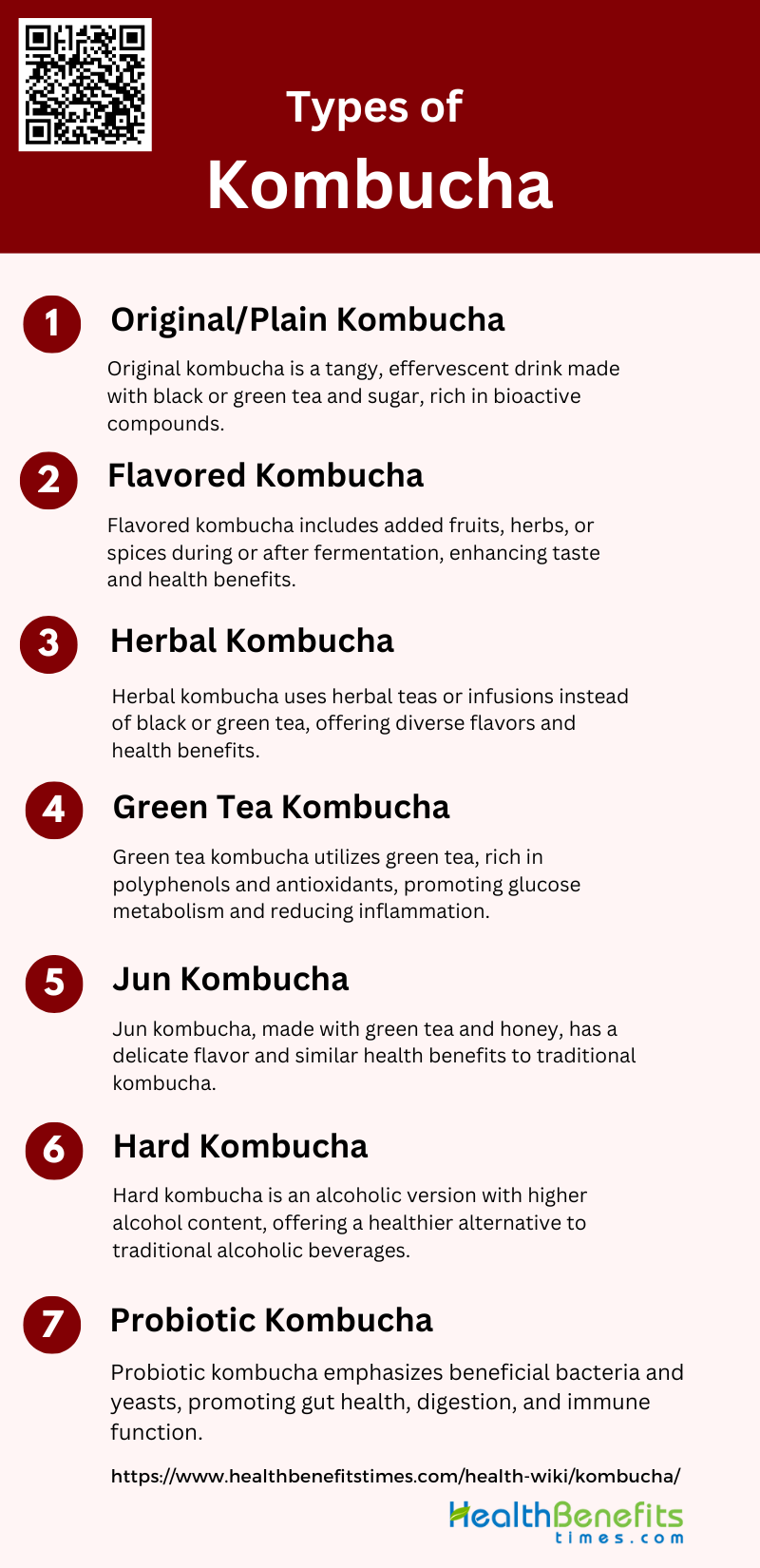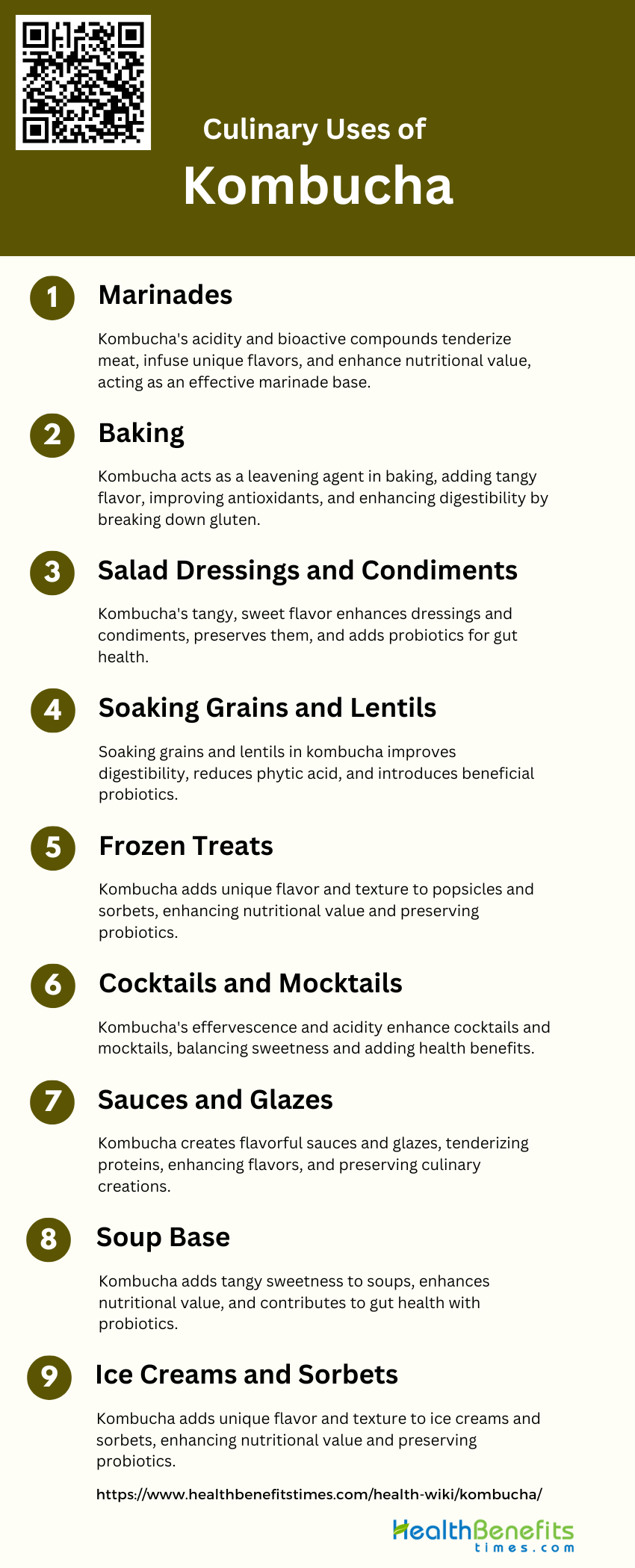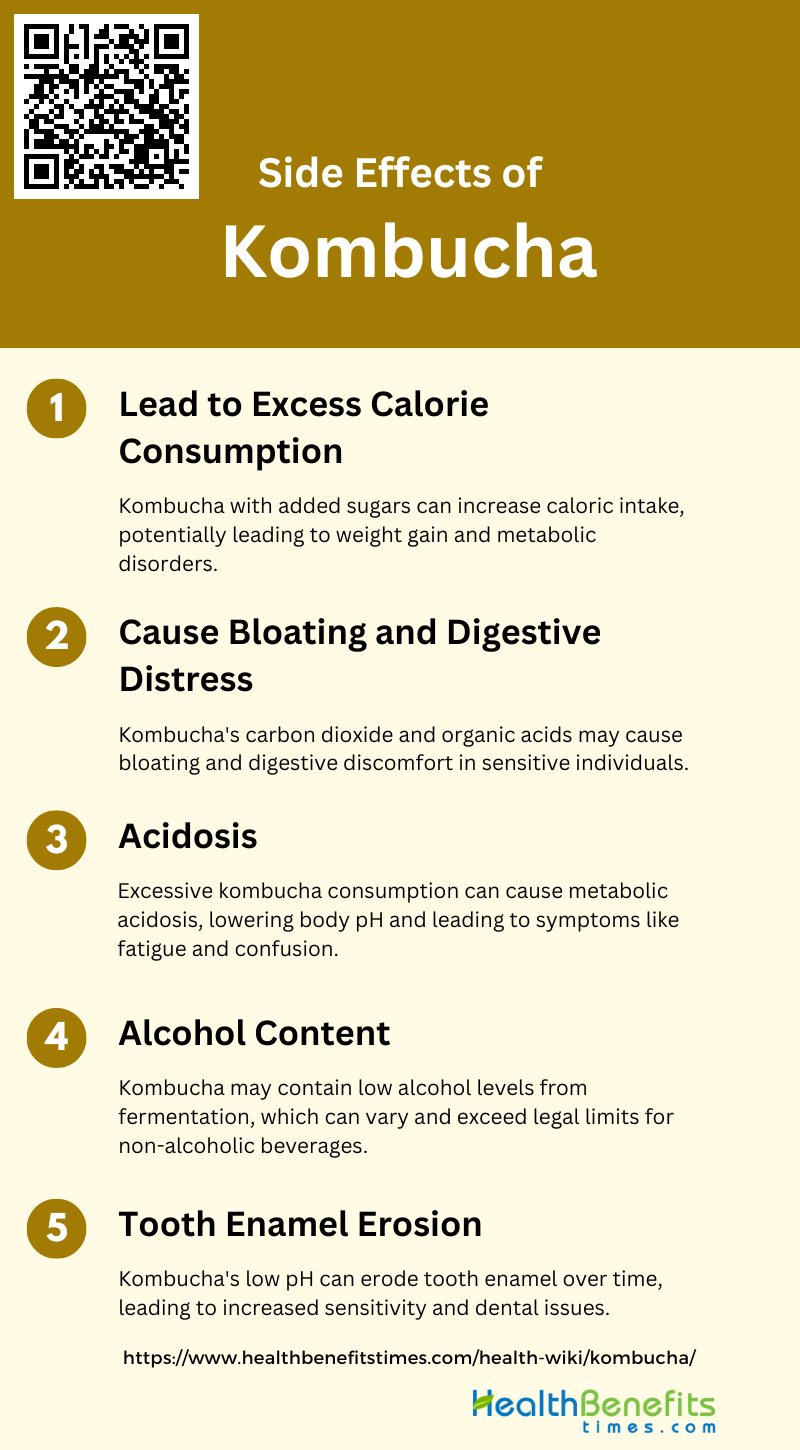 Kombucha is a fermented tea beverage that has gained immense popularity in recent years. It is produced by fermenting sweetened tea with a symbiotic culture of bacteria and yeast, commonly known as a SCOBY (Symbiotic Culture of Bacteria and Yeast). The fermentation process produces a slightly effervescent, tart, and mildly alcoholic beverage that is thought to provide several health benefits because of its probiotic properties and antioxidant content. Kombucha has a long history, with origins dating back to ancient China, and has been consumed for centuries for its purported health-promoting effects.
Kombucha is a fermented tea beverage that has gained immense popularity in recent years. It is produced by fermenting sweetened tea with a symbiotic culture of bacteria and yeast, commonly known as a SCOBY (Symbiotic Culture of Bacteria and Yeast). The fermentation process produces a slightly effervescent, tart, and mildly alcoholic beverage that is thought to provide several health benefits because of its probiotic properties and antioxidant content. Kombucha has a long history, with origins dating back to ancient China, and has been consumed for centuries for its purported health-promoting effects.
Types of Kombucha
Kombucha is a fermented tea beverage that comes in various types and flavors. Here are some common types of kombucha:
1. Original/Plain Kombucha
Original or plain kombucha is a fermented tea beverage made using a symbiotic culture of bacteria and yeast (SCOBY). This traditional drink is typically prepared with black or green tea and sugar, which undergoes fermentation to produce a slightly effervescent, tangy beverage rich in organic acids, vitamins, and polyphenols. The fermentation process results in the production of bioactive compounds that contribute to its antioxidant, antimicrobial, and anti-inflammatory properties. The microbial diversity in plain kombucha includes acetic acid bacteria and yeasts, which play a crucial role in its health benefits, such as improving gut health and potentially aiding in the prevention of metabolic disorders.
2. Flavored Kombucha
Flavored kombucha is a variation of the traditional drink, where additional ingredients such as fruits, herbs, or spices are added either during or after the fermentation process. These additions not only enhance the taste but also contribute additional bioactive compounds, which can further boost the health benefits of the beverage. For instance, kombucha flavored with herbs like mint or chrysanthemum has been shown to contain unique volatile organic compounds that provide distinct aromatic profiles and potential health benefits. The choice of flavoring agents can significantly impact the chemical composition and sensory characteristics of the final product, making it a versatile and appealing option for consumers.
3. Herbal Kombucha
Herbal kombucha is made by fermenting herbal teas or infusions instead of traditional black or green tea. This variation allows for a wide range of flavors and potential health benefits, depending on the herbs used. For example, kombucha made with rooibos tea has been found to have a unique microbial composition and bioactive profile, including lower ethanol content and significant antioxidant activity. Herbal kombuchas can offer a refreshing alternative to traditional tea-based kombuchas while still providing the probiotic and health-promoting properties associated with the fermentation process.
4. Green Tea Kombucha
Green tea kombucha is a popular variation that uses green tea as the base for fermentation. Green tea is rich in polyphenols, particularly catechins, which are known for their strong antioxidant properties. The fermentation process enhances these properties, making green tea kombucha a potent source of antioxidants. Studies have shown that green tea kombucha can improve glucose metabolism, reduce oxidative stress, and decrease inflammation, making it beneficial for managing metabolic disorders. The unique combination of green tea’s bioactive compounds and the fermentation metabolites contributes to its health-promoting effects.
5. Jun Kombucha
Jun kombucha is a less common variation that uses green tea and honey instead of black tea and sugar. This type of kombucha is often referred to as the “champagne of kombucha” due to its lighter and more delicate flavor profile. The use of honey as a fermentable sugar source introduces different microbial dynamics and bioactive compounds compared to traditional kombucha. While specific studies on Jun kombucha are limited, it is believed to share similar health benefits, such as antioxidant and antimicrobial properties, due to the fermentation process and the bioactive compounds present in green tea and honey.
6. Hard Kombucha
Hard kombucha is an alcoholic version of the traditional beverage, with higher alcohol content achieved through extended fermentation or the addition of extra fermentable sugars. This type of kombucha appeals to consumers looking for a healthier alternative to traditional alcoholic beverages. Despite its higher alcohol content, hard kombucha retains many of the health benefits associated with regular kombucha, such as antioxidant and antimicrobial properties, due to the presence of bioactive compounds from the tea and the fermentation process. However, it is important to consume hard kombucha in moderation due to its alcohol content.
7. Probiotic Kombucha
Probiotic kombucha emphasizes the presence of beneficial bacteria and yeasts that contribute to gut health. The fermentation process in kombucha results in the production of various probiotic strains, including lactic acid bacteria, which can help maintain a healthy gut microbiome. Studies have shown that kombucha contains a diverse microbial community that can provide probiotic benefits, such as improving digestion, enhancing immune function, and potentially preventing gastrointestinal disorders. The probiotic potential of kombucha makes it a valuable addition to a diet focused on gut health and overall well-being.
Health Benefits of Kombucha
Kombucha is celebrated for its numerous health benefits. From improving gut health to boosting the immune system, this drink offers a range of advantages that contribute to overall well-being. Here are some key health benefits of kombucha:
1. Weight Loss
Studies on Wistar rats fed a high-fat high-fructose diet showed that kombucha consumption led to a reduction in total adipose tissue and blood triglyceride levels, indicating its potential to combat obesity and related metabolic disorders. Additionally, kombucha’s modulation of gut microbiota may contribute to weight management by promoting the growth of beneficial bacteria and enhancing metabolic processes.
2. Digestive Health
The fermentation process produces a symbiotic culture of bacteria and yeast (SCOBY) that can help balance the gut microbiota. Studies have shown that kombucha consumption can improve intestinal health by increasing the production of short-chain fatty acids like propionate and promoting the growth of beneficial bacteria such as Adlercreutzia. These effects can help alleviate symptoms of digestive disorders and improve overall gut health.
3. Immune Support
Research indicates that kombucha has antimicrobial properties that can help fight off harmful pathogens. Additionally, its antioxidant properties can reduce oxidative stress, thereby supporting the immune system. The presence of probiotics in kombucha also plays a role in modulating the immune response by maintaining a healthy gut microbiota.
4. Detoxification
Kombucha Studies have shown that kombucha consumption can improve liver detoxification processes by increasing the activity of detoxifying enzymes and reducing liver steatosis. The beverage’s high content of phenolic compounds and antioxidants helps neutralize harmful free radicals, further aiding in detoxification. These properties make kombucha a valuable addition to detox diets and liver health regimens.
5. Contains Probiotics
The fermentation process produces a diverse microbial community that includes beneficial bacteria and yeasts. These probiotics can help improve digestion, boost the immune system, and prevent gastrointestinal infections. Although the exact probiotic content of kombucha can vary, its regular consumption is generally associated with positive effects on gut health.
6. Antioxidants
The beverage contains various polyphenols and vitamins that contribute to its antioxidant capacity. Studies have demonstrated that kombucha can increase plasma total antioxidant capacity and superoxide dismutase activity, thereby reducing oxidative stress and inflammation. These antioxidant properties are beneficial for overall health and can help prevent chronic diseases.
7. Joint Health
The beverage contains glucosamines, which are known to improve joint function and reduce the symptoms of arthritis. Additionally, the antioxidants and polyphenols in kombucha can help reduce inflammation, which is a common cause of joint pain and stiffness. Regular consumption of kombucha may, therefore, contribute to better joint health and mobility.
8. Mental Health
Kombucha’s impact on mental health is linked to its ability to improve gut health and reduce inflammation. The gut-brain axis plays a crucial role in mental well-being, and a healthy gut microbiota can positively influence mood and cognitive function. Kombucha’s probiotic content helps maintain a balanced gut microbiota, which can alleviate symptoms of anxiety and depression. Additionally, the beverage’s antioxidant properties can protect the brain from oxidative stress, further supporting mental health.
How to Make Kombucha at Home?
Making kombucha at home is that allows you to enjoy this delicious and healthy beverage at a fraction of the cost of store-bought versions. With just a few simple ingredients and some basic equipment, you can start brewing your own kombucha in no time. Follow these steps to get started:
1. Prepare the Tea Base: Boil 1 gallon of water. Add 1 cup of sugar to the boiling water and stir until dissolved. Remove from heat and add the tea bags. Let it steep until the water cools to room temperature. This can take several hours.
2. Combine the Ingredients: Once the tea is cool, remove the tea bags or strain out the loose tea. Pour the sweetened tea into the glass jar. Add 1 cup of starter tea to the jar. With clean hands, gently place the SCOBY into the jar.
3. Fermentation: Cover the jar with the cloth and secure it with a rubber band. Place the jar in a warm, dark place (about 70-75°F or 21-24°C) where it won’t be disturbed. Let it ferment for 7-10 days. The fermentation time can vary depending on the temperature and your taste preference. The longer it ferments, the less sweet and more vinegary it will become.
4. Taste Test: After 7 days, start tasting the kombucha daily by pouring a small amount into a cup. When it reaches the balance of sweetness and tartness you prefer, it’s ready for the next step.
5. Bottling: With clean hands, remove the SCOBY and place it on a clean plate. If you see a new SCOBY forming, you can separate it from the original SCOBY. Reserve 1-2 cups of the kombucha as starter tea for your next batch. Pour the fermented kombucha into bottles using a funnel, leaving about an inch of headspace at the top of each bottle. Seal the bottles tightly.
Culinary Uses of kombucha
From marinades to salad dressings, this tangy drink can enhance a variety of dishes. Here are some creative culinary uses of kombucha:
1. Marinades
Kombucha, with its acidic profile and rich bioactive compounds, serves as an excellent base for marinades. The organic acids and polyphenols present in kombucha can tenderize meat and infuse it with a unique flavor. The antimicrobial properties of kombucha also help in preserving the meat during the marination process. Additionally, the fermentation metabolites from the SCOBY can enhance the nutritional profile of the marinade, making it a healthier option.
2. Baking
In baking, kombucha can be used as a leavening agent due to its acidic nature, which reacts with baking soda to produce carbon dioxide, helping dough rise. The bioactive compounds in kombucha, such as polyphenols and organic acids, can also add a subtle tangy flavor and improve the antioxidant properties of baked goods. Moreover, the fermentation process can break down some of the gluten, making baked products more digestible.
3. Salad Dressings and Condiments
Its rich content of organic acids and polyphenols can enhance the flavor profile and nutritional value of dressings. The antimicrobial properties of kombucha can also help in preserving these condiments for a longer period. Additionally, the probiotics present in kombucha can contribute to gut health when consumed as part of a salad dressing.
4. Soaking Grains and Lentils
Soaking grains and lentils in kombucha can improve their digestibility and nutritional profile. The organic acids in kombucha help in breaking down phytic acid, which can inhibit the absorption of essential minerals. The fermentation process can also introduce beneficial probiotics into the grains and lentils, enhancing their health benefits. This method can be particularly useful for individuals with digestive issues, as it makes the grains and lentils easier to digest.
5. Frozen Treats
Kombucha can be used to create refreshing frozen treats like popsicles and sorbets. Its natural acidity and slight effervescence add a unique flavor and texture to these treats. The antioxidants and polyphenols present in kombucha can also enhance the nutritional value of frozen desserts. Additionally, the probiotics in kombucha can survive the freezing process, providing a gut health benefit even in frozen form.
6. Cocktails and Mocktails
Its natural acidity can balance the sweetness of other ingredients, while its bioactive compounds add a layer of complexity to the drink. The antimicrobial properties of kombucha can also help in preserving the drink for a longer period. Moreover, the probiotics present in kombucha can offer a health benefit, making these beverages a healthier alternative to traditional cocktails.
7. Sauces and Glazes
Its acidic nature helps in breaking down proteins, making it an excellent tenderizer for meats. The rich content of organic acids and polyphenols can enhance the flavor and nutritional profile of sauces and glazes. The antimicrobial properties of kombucha can also help in preserving these culinary creations. Additionally, the fermentation metabolites can add a unique depth of flavor to the sauces and glazes.
8. Soup Base
Its rich content of bioactive compounds, including polyphenols and organic acids, can enhance the nutritional value of the soup. The probiotics present in kombucha can also contribute to gut health when consumed as part of a soup. Additionally, the antimicrobial properties of kombucha can help in preserving the soup for a longer period.
9. Ice Creams and Sorbets
Its natural acidity and slight effervescence can enhance the sensory experience of these frozen desserts. The antioxidants and polyphenols present in kombucha can also improve the nutritional profile of ice creams and sorbets. Moreover, the probiotics in kombucha can survive the freezing process, providing a gut health benefit even in frozen form.
Side Effects Kombucha
While kombucha is praised for its potential health benefits, it is important to be aware of its possible side effects. Overconsumption or improper fermentation can lead to adverse reactions. Here are some common side effects of kombucha:
1. Lead to Excess Calorie Consumption
Kombucha, a fermented tea beverage, is often marketed as a health drink. However, it can lead to excess calorie consumption, particularly when it contains added sugars. Many commercial kombucha products have significant amounts of sugar to enhance flavor, which can contribute to increased caloric intake. This is particularly concerning for individuals who consume kombucha regularly, as the cumulative effect can lead to weight gain and associated metabolic disorders. Studies have shown that while kombucha has beneficial properties, the sugar content can negate these benefits by contributing to obesity and related comorbidities.
2. Cause Bloating and Digestive Distress
Kombucha is known for its probiotic content, which can positively affect gut health. However, for some individuals, the fermentation process can lead to bloating and digestive distress. The presence of carbon dioxide and organic acids, such as acetic acid, can cause gastrointestinal discomfort, especially in those with sensitive digestive systems. A study assessing the safety and tolerability of kombucha-based beverages found that while generally well-tolerated, some participants reported symptoms like bloating and abdominal discomfort. These side effects highlight the need for moderation and individual assessment when consuming kombucha.
3. Acidosis
Acidosis is a potential risk associated with excessive kombucha consumption due to its acidic nature. Kombucha contains various organic acids, including acetic, gluconic, and glucuronic acids, which can lower the body’s pH if consumed in large quantities. This condition, known as metabolic acidosis, can lead to symptoms such as fatigue, confusion, and rapid breathing. Although rare, there have been case reports linking high kombucha intake to acidosis, emphasizing the importance of consuming this beverage in moderation. Individuals with pre-existing health conditions should consult healthcare providers before incorporating kombucha into their diet.
4. Alcohol Content
Despite being marketed as a non-alcoholic beverage, kombucha can contain small amounts of alcohol due to the fermentation process. The symbiotic culture of bacteria and yeast (SCOBY) used in kombucha production ferments sugars into alcohol and acids. While the alcohol content is typically low, it can vary depending on the fermentation time and conditions. Some commercial kombucha products have been found to exceed the legal limit for non-alcoholic beverages, which can be a concern for individuals avoiding alcohol for health, religious, or personal reasons. Regulatory oversight and proper labeling are essential to inform consumers about the potential alcohol content in kombucha.
5. Tooth Enamel Erosion
The acidic nature of kombucha poses a risk to dental health, particularly concerning tooth enamel erosion. Kombucha’s pH can be as low as 2.5, similar to that of vinegar, which can erode tooth enamel over time. Regular consumption of acidic beverages can lead to increased tooth sensitivity, cavities, and other dental issues. Studies have highlighted the need for caution, recommending that kombucha be consumed in moderation and followed by rinsing the mouth with water to mitigate its erosive effects on tooth enamel. Dental professionals advise against brushing teeth immediately after consuming acidic drinks to prevent further enamel damage.





